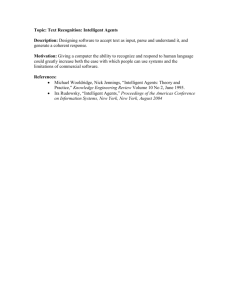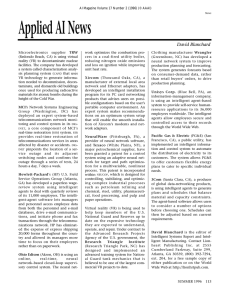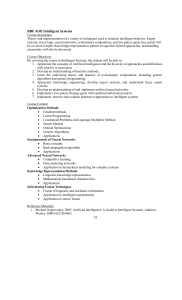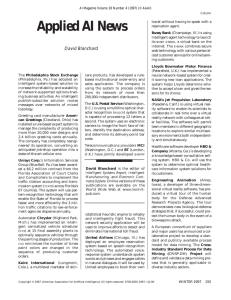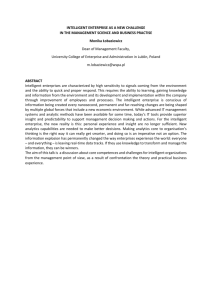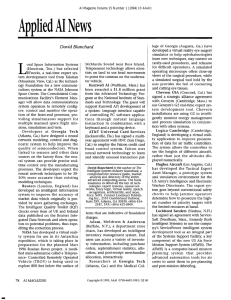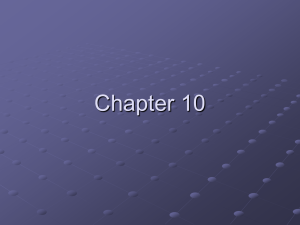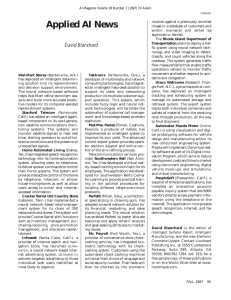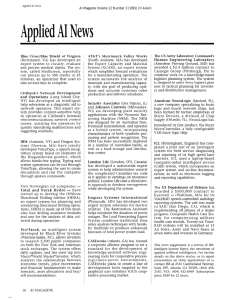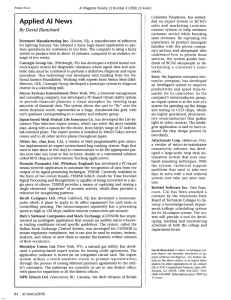multibillion-dollar communi- cations system. is a satellite-
advertisement
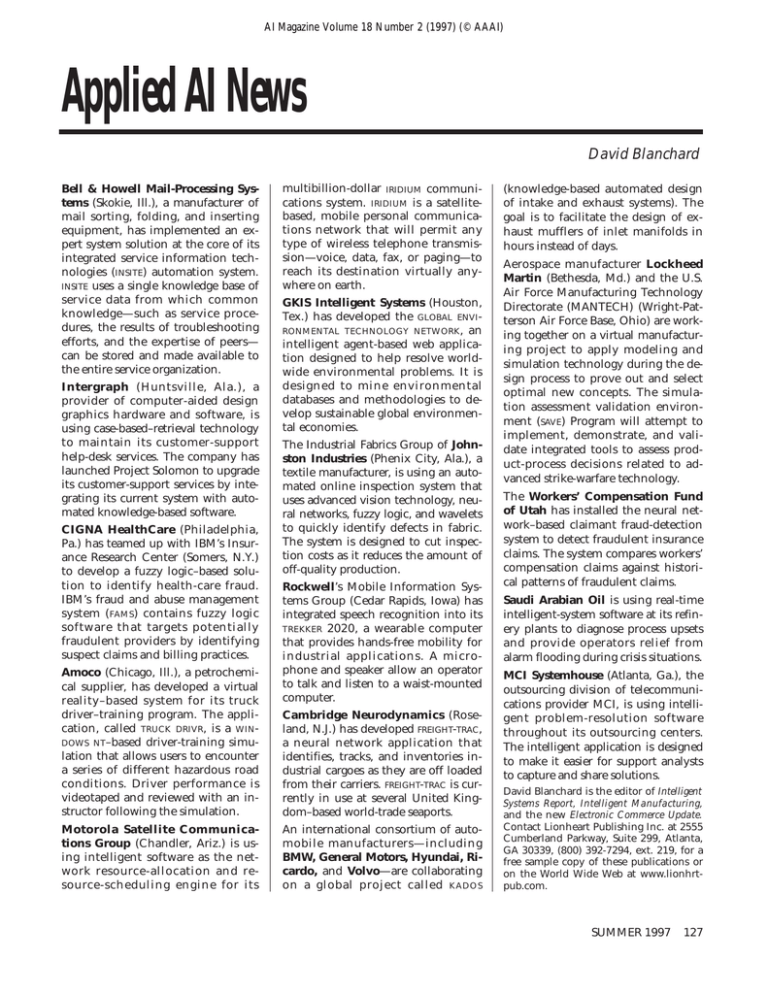
AI Magazine Volume 18 Number 2 (1997) (© AAAI) Applied AI News David Blanchard Bell & Howell Mail-Processing Systems (Skokie, Ill.), a manufacturer of mail sorting, folding, and inserting equipment, has implemented an expert system solution at the core of its integrated service information technologies (INSITE) automation system. INSITE uses a single knowledge base of service data from which common knowledge—such as service procedures, the results of troubleshooting efforts, and the expertise of peers— can be stored and made available to the entire service organization. Intergraph (Huntsville, Ala.), a provider of computer-aided design graphics hardware and software, is using case-based–retrieval technology to maintain its customer-support help-desk services. The company has launched Project Solomon to upgrade its customer-support services by integrating its current system with automated knowledge-based software. CIGNA HealthCare (Philadelphia, Pa.) has teamed up with IBM’s Insurance Research Center (Somers, N.Y.) to develop a fuzzy logic–based solution to identify health-care fraud. IBM’s fraud and abuse management system ( FAMS ) contains fuzzy logic software that targets potentially fraudulent providers by identifying suspect claims and billing practices. Amoco (Chicago, Ill.), a petrochemical supplier, has developed a virtual reality–based system for its truck driver–training program. The application, called TRUCK DRIVR, is a WINDOWS NT–based driver-training simulation that allows users to encounter a series of different hazardous road conditions. Driver performance is videotaped and reviewed with an instructor following the simulation. Motorola Satellite Communications Group (Chandler, Ariz.) is using intelligent software as the network resource-allocation and resource-scheduling engine for its multibillion-dollar IRIDIUM communications system. IRIDIUM is a satellitebased, mobile personal communications network that will permit any type of wireless telephone transmission—voice, data, fax, or paging—to reach its destination virtually anywhere on earth. GKIS Intelligent Systems (Houston, Tex.) has developed the GLOBAL ENVIRONMENTAL TECHNOLOGY NETWORK , an intelligent agent-based web application designed to help resolve worldwide environmental problems. It is designed to mine environmental databases and methodologies to develop sustainable global environmental economies. The Industrial Fabrics Group of Johnston Industries (Phenix City, Ala.), a textile manufacturer, is using an automated online inspection system that uses advanced vision technology, neural networks, fuzzy logic, and wavelets to quickly identify defects in fabric. The system is designed to cut inspection costs as it reduces the amount of off-quality production. Rockwell’s Mobile Information Systems Group (Cedar Rapids, Iowa) has integrated speech recognition into its TREKKER 2020, a wearable computer that provides hands-free mobility for industrial applications. A microphone and speaker allow an operator to talk and listen to a waist-mounted computer. Cambridge Neurodynamics (Roseland, N.J.) has developed FREIGHT-TRAC, a neural network application that identifies, tracks, and inventories industrial cargoes as they are off loaded from their carriers. FREIGHT-TRAC is currently in use at several United Kingdom–based world-trade seaports. An international consortium of automobile manufacturers—including BMW, General Motors, Hyundai, Ricardo, and Volvo—are collaborating on a global project called KADOS (knowledge-based automated design of intake and exhaust systems). The goal is to facilitate the design of exhaust mufflers of inlet manifolds in hours instead of days. Aerospace manufacturer Lockheed Martin (Bethesda, Md.) and the U.S. Air Force Manufacturing Technology Directorate (MANTECH) (Wright-Patterson Air Force Base, Ohio) are working together on a virtual manufacturing project to apply modeling and simulation technology during the design process to prove out and select optimal new concepts. The simulation assessment validation environment (SAVE) Program will attempt to implement, demonstrate, and validate integrated tools to assess product-process decisions related to advanced strike-warfare technology. The Workers’ Compensation Fund of Utah has installed the neural network–based claimant fraud-detection system to detect fraudulent insurance claims. The system compares workers’ compensation claims against historical patterns of fraudulent claims. Saudi Arabian Oil is using real-time intelligent-system software at its refinery plants to diagnose process upsets and provide operators relief from alarm flooding during crisis situations. MCI Systemhouse (Atlanta, Ga.), the outsourcing division of telecommunications provider MCI, is using intelligent problem-resolution software throughout its outsourcing centers. The intelligent application is designed to make it easier for support analysts to capture and share solutions. David Blanchard is the editor of Intelligent Systems Report, Intelligent Manufacturing, and the new Electronic Commerce Update. Contact Lionheart Publishing Inc. at 2555 Cumberland Parkway, Suite 299, Atlanta, GA 30339, (800) 392-7294, ext. 219, for a free sample copy of these publications or on the World Wide Web at www.lionhrtpub.com. SUMMER 1997 127
